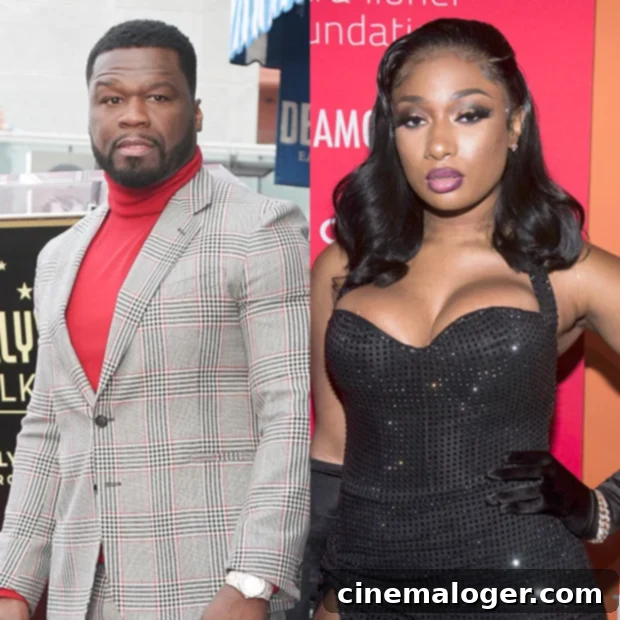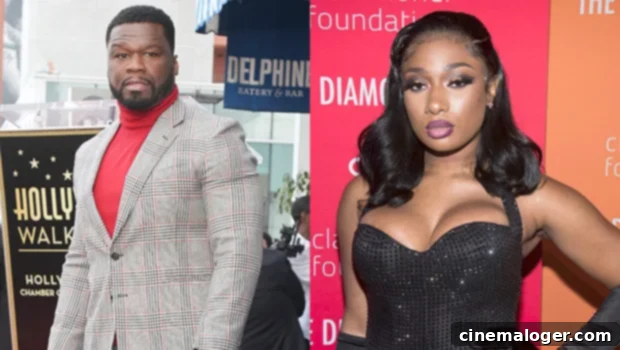From Mockery to Apology: How Megan Thee Stallion’s Truth Triggered 50 Cent’s Public Regret
In a rare display of public remorse, renowned rapper Curtis “50 Cent” Jackson issued a heartfelt apology to fellow artist Megan Thee Stallion, retracting earlier social media posts that had made light of her traumatic shooting incident. This significant turnaround came after Megan bravely opened up about the harrowing experience, shedding light on the severe physical and emotional toll it had taken on her. The incident sparked a broader conversation about celebrity accountability, the spread of misinformation, and the vital importance of believing victims.
It’s widely known that securing an apology from 50 Cent, a figure synonymous with his unfiltered and often controversial online presence, is a monumental task. Yet, the gravity of mocking someone who has endured a violent attack proved to be a catalyst for such a rare admission. When initial reports surfaced about Megan Thee Stallion sustaining a gunshot wound during a night out with Tory Lanez, 50 Cent, like many others caught in the whirlwind of speculative social media, shared several offensive memes. These posts, which depicted Megan in various demeaning scenarios related to the shooting, quickly garnered widespread criticism for their insensitivity and victim-blaming undertones. However, the narrative shifted dramatically when Megan herself chose to reveal the deeply traumatizing reality of her situation, compelling even a figure as formidable as 50 Cent to re-evaluate his initial, ill-considered reaction.
https://www.instagram.com/p/CDKrJP8Htdb/
Responding to Megan’s courageous and emotional public statement, 50 Cent took to Instagram to convey his apology. In his post, which notably included a segment of Megan’s powerful Instagram Live video, he wrote, “Damn I didn’t think this s*** was real. It sounded so crazy. [Megan] I’m glad [you’re] feeling better and I hope you can accept my apology. I posted a meme that was floating around. I wouldn’t have done that if I knew you was really hurt. Sorry.” This message, coming from a highly influential artist, underscored the potential for public figures to acknowledge their mistakes and the impact of their words. His explanation, stating he genuinely didn’t believe the severity of the situation due to its “crazy” nature, offered a glimpse into how easily misinformation can lead to harmful reactions, especially when fueled by internet culture and a lack of verified facts. The apology was a crucial moment, signaling a shift from a culture of skepticism and mockery to one of empathy and understanding, at least from one prominent voice.
The incident itself unfolded on July 12, following a house party in Hollywood Hills attended by Megan and fellow artist Tory Lanez. The evening took a dark turn when Megan was shot. In the immediate aftermath, police confirmed that Tory Lanez was arrested for carrying a concealed weapon in a vehicle, a felony charge. The initial confusion surrounding the event was further compounded by early media reports and rumors suggesting Megan’s injuries were sustained from stepping on broken glass. This misleading narrative circulated widely, inadvertently downplaying the severity of her condition and the criminal nature of the act committed against her. The public was left to piece together fragmented information, making it challenging to discern truth from speculation. This period of uncertainty created fertile ground for jokes and memes, unfortunately at Megan’s expense, highlighting the precarious position of celebrities in the face of unverified news and the speed at which online narratives can form.
View this post on InstagramI was never arrested. This whole experience was an eye opener and a blessing in disguise. I hate that it took this experience for me to learn how to protect my energy.
A post shared by Hot Girl Meg (@theestallion) on
Just three days after the initial reports, on July 15, Megan Thee Stallion courageously took to Instagram to set the record straight and reclaim her narrative. She posted a powerful statement that unequivocally debunked the “glass injury” myth, revealing the shocking truth: “I suffered gunshot wounds as a result of a crime that was committed against me and done with the intention to physically harm me.” She clarified, “I was never arrested, the police officer drove me to the hospital where I underwent surgery to remove the bullets. I’m incredibly grateful to be alive and I’m expected to make a full recovery, but it was important for me to clarify the details of this traumatic night.” This direct address from Megan herself was a pivotal moment, shifting the public perception from one of speculation to a stark realization of the violent reality she had faced. Her words resonated deeply, forcing many to confront the impact of their initial skepticism and the damaging effect of misinformation. The decision to speak out, despite the vulnerability it entailed, allowed her to control her story and underscore the severity of the incident.
Megan’s choice to come forward with her truth was not merely about correcting factual errors; it was a profound act of resilience and self-preservation. In a world often quick to sensationalize and criticize, especially towards women of color in the public eye, her candidness demanded respect and fostered empathy. The physical pain of gunshot wounds, followed by surgery, was compounded by the emotional distress of being publicly ridiculed and disbelieved. Her statement became a beacon for victims everywhere, highlighting the importance of speaking out against violence and the insidious nature of victim-blaming. Despite the trauma, Megan’s focus remained on her recovery and clarifying her experience, demonstrating immense strength under immense pressure. Her refusal to identify the shooter at that time also underscored the complexity of such situations and her right to process the event on her own terms.

After a period of understandable silence on social media, Megan Thee Stallion made an emotional return on July 27 with an Instagram Live session that profoundly impacted her fans and critics alike. Though appearing stunning, she became visibly emotional while recounting the events of that fateful night, describing it as the “worst experience” of her life and articulating how “super scary” it was to have bullets surgically removed from her foot. With tears in her eyes, she passionately insisted, “It was nothing for y’all to make up stories about. I didn’t put my hands on nobody. I didn’t deserve to get shot. I didn’t do s***. Thank God the bullets didn’t touch bones. Like, they didn’t break tendons. I know my mama, my daddy and my granny had to be looking out for me.” Her raw vulnerability served as a powerful rebuke to those who had spread falsehoods or mocked her pain. It was a plea for humanity and a reminder that behind every celebrity headline lies a real person with real emotions and real trauma. Her unwavering conviction, combined with her deep gratitude for her life and the belief that her ancestors watched over her, turned her live stream into a moment of profound connection and empowerment for many.
This entire ordeal – from the initial shooting and misleading reports to Megan’s brave clarifications and 50 Cent’s eventual apology – serves as a crucial case study in contemporary celebrity culture, media responsibility, and the dynamics of social media. It highlighted the alarming speed at which misinformation can proliferate online, often leading to damaging public discourse and unjust victim-blaming. The incident also underscored the significant platform that public figures wield and the ethical responsibility that comes with it. 50 Cent’s retraction, though belated, signaled a recognition of this responsibility and the power of empathy. Megan Thee Stallion, through her unwavering honesty and resilience, transformed a deeply personal trauma into a public lesson on believing victims, combating online cruelty, and the strength it takes to reclaim one’s narrative in the face of adversity. This episode reinforces the ongoing need for critical media consumption, greater accountability from public figures, and a collective commitment to fostering a more supportive and less judgmental online environment, especially when dealing with sensitive and violent events.
